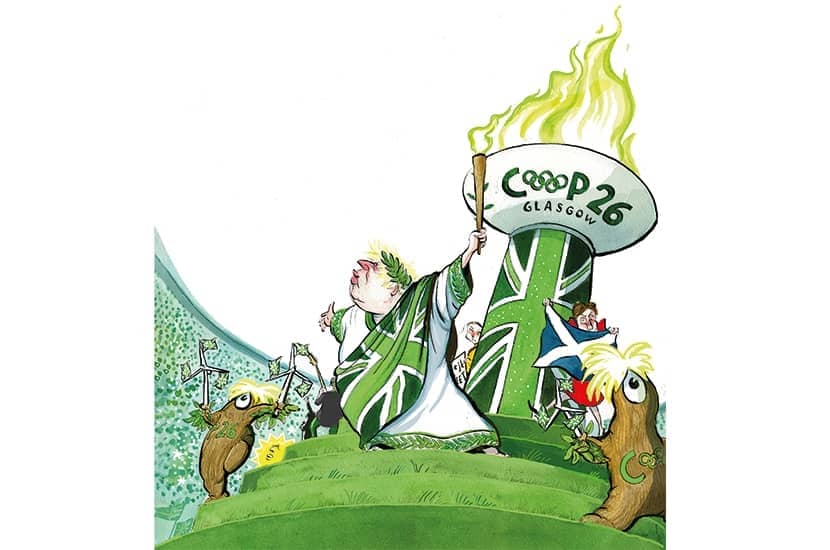Carbon deceit
Sir: At this week’s climate change conference, countries will be urged to follow the UK’s ‘lead’ in setting the goal of net-zero carbon emissions by 2050 (‘Cop out’, 30 October). This goal is impossible for any advanced economy based on mass consumption. The majority of British manufacturing has shifted abroad, where labour is cheap and items are mostly produced with electricity supplied by coal and other fossil fuels. For a real figure for Britain’s emissions, the consumption of goods produced overseas must be included. As our consumption has increased enormously over the past 30 years, this carbon addition will be substantial.
It is a dangerous nonsense for rich countries, therefore, to pretend they are cutting carbon emissions. A British child during their lifetime may produce at least 200 times more carbon than a poor African child. And it is the poor child who is already suffering from climate change. For a meaningful response to climate change, reality must take precedence over PR.
Michael Stone
Moretonhampstead, Devon
The NI threshold
Sir: I welcome the Chancellor’s decision to reduce the universal credit taper rate to 55 per cent (‘Sunak’s surprise’, 30 October), but has he missed a trick? The amount you can earn before paying income tax is £12,570; many low paid and part-time workers earn below this level but still pay National Insurance. We also need to bear in mind that the rate of NI will increase by 1.25 per cent from April. Should the Chancellor have increased the NI threshold, giving the low paid an increase in their net pay? Isn’t it about time it was equalised with the tax threshold?
Alexander Guberman
Pinner, Middlesex
Taking the fifth
Sir: George Osborne (Diary, 30 October) reminds us of his ‘emergency’ Budget of 2010. I wonder whether he imagined at the time that his hike of VAT to 20 per cent would still be in effect 11 years — and three chancellors — later.
Stephen Barker
Staffordshire and Worcestershire Canal
The sadness of adoption
Sir: Linden Kemkaran wrote movingly (‘The stolen children’, 30 October) of the discovery of her elder brother’s existence and adoption. Twenty years earlier than ‘Pedro’, I was born and after five months’ maternal care, was handed over to my new family before the welfare authorities moved in to claim me. All adoptions are a sadness; most involve a degree of theft. Few women who carry a child to term consider their babies ‘a mess’ to be tidied away. For all parties in the adoption quadrangle — the mother, her child, the adopting family, and the mother’s subsequent family — life’s horizon acquires a low-lying fog of desolation and regret.
Linden Kemkaran’s mother sought out her son when the law changed, but was rebuffed. I hope that if Pedro comes to regret this, his birth family will forgive and welcome him. I was told my mother had died when I was ten, and the subject of adoption was closed until my adoptive parents died. When I did finally open the files, I was able to trace my birth family. My natural parents were dead, and my younger brother had died before his mother. My younger sister wrote a curt rejection but allowed me one photocopy of an old picture of my mother. There has been nothing else, and even at 75 the pain is intense. I feel that without even a basic knowledge and understanding of her I somehow cannot do justice to the woman who gave me life.
I do not believe governments should apologise for the mistakes made by their forerunners. But please heaven, let us all allow more kindness to lone women who have lost their children. Adoption may on occasion be the only solution, but that doesn’t make it more than the least worst.
Bill Ellerd-Styles
Orsett, Essex
White Fang
Sir: I fear Charles Moore (Notes, 30 October) is muddling fact and fiction. It was the real Lord Redesdale, Nancy’s father, who wept over Tess of the d’Urbervilles and then was angry when told it was fiction. The fictional Uncle Matthew had only read one book, White Fang, because it was so good that further novel reading was unnecessary. He wept copiously at Romeo and Juliet, blaming the papist padré and the ‘dismal bitch’ of an RC nurse for the tragic ending.
John Fellows
Bungay, Suffolk
Solar energies
Sir: I sympathise with Jeremy Frankpitt (Letters, 30 October) about the difficulty of connecting solar PV to the National Grid. I’ve spent more than two years trying to find somewhere sensible to fund and build a modestly sized solar farm. Nevertheless the National Grid are positively helpful compared with local planners. The planning process in the UK is barely fit for purpose. Where are the reforms we have been promised so many times in the past?
Andrew Dent
Chipping Norton, Oxon
Back to its roots
Sir: I was heartened to see the proposal from Melanie McDonagh about Halloween (‘Notes on Halloween turnips’, 30 October). Growing up in Scotland in the 1950s, we too had turnip lanterns and ‘guising’, which required us to dress up in homemade costumes, with facial decoration drawn with soot. We would visit the neighbours where we had to sing a song or otherwise perform to earn a small treat. There was sometimes apple bobbing if you were lucky. Halloween was on 31 October irrespective of which day of the week it was. The elaborate American Halloween weekend which our grandchildren now celebrate is not a patch on what we enjoyed.
George Rattray
East Meon, Hampshire






Comments